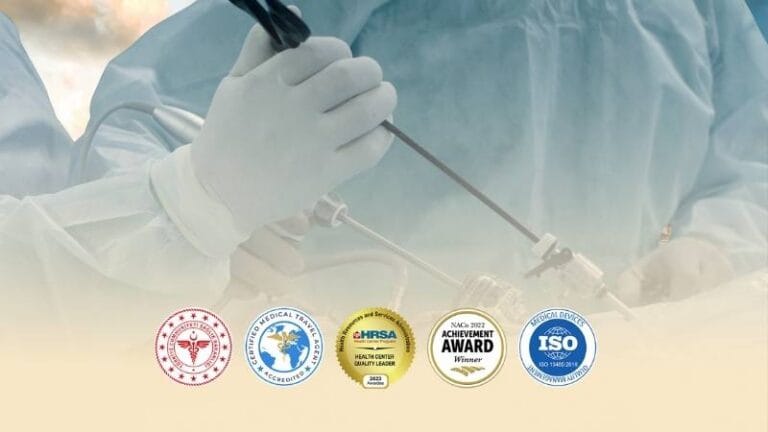Opting for Transit bipartition in Turkey for diabetes is often the definitive turning point for patients exhausted by the daily burden of insulin injections and the fear of long-term complications like kidney failure or neuropathy. At Clinic Care Center, we offer this advanced metabolic procedure not merely as a weight-loss tool, but as a functional hormonal intervention designed to put Type 2 Diabetes into remission and restore your metabolic health.
The “Double Route” Mechanism: Why It Works
To understand why Transit Bipartition (TB) is superior to older surgeries for diabetes, you must understand the “Double Route” concept. Unlike a traditional bypass that blocks the natural digestive path, TB preserves the natural anatomy while creating a powerful hormonal shortcut.
First, the surgeon performs a Sleeve Gastrectomy to reduce stomach volume. Then, a connection is made between the lower stomach and the end of the small intestine (ileum). This creates two paths for food:
- Path 1 (Natural): Approximately 1/3 of the food continues through the duodenum. This ensures vital absorption of vitamins and minerals (Iron, Calcium, B12), significantly reducing the risk of malnutrition compared to a standard bypass.
- Path 2 (The Shortcut): The remaining 2/3 of the food bypasses the upper intestine and goes directly to the lower bowel. This undigested food stimulates the massive release of GLP-1 and PYY Hormones. These hormones signal the pancreas to produce insulin immediately and decrease insulin resistance in the body.
Clinic Care Center: Expert Warning
Metabolic surgery is NOT a magic wand for everyone. It is designed specifically for Type 2 Diabetes patients who still have a functional pancreas. It typically does NOT work for Type 1 Diabetes. Before we accept any patient, we must perform a C-Peptide Test to measure your ‘Pancreatic Reserve.’ If your beta cells are exhausted and produce no insulin, surgery will not help. We prioritize medical honesty over surgical volume.
Transit Bipartition vs. Traditional Gastric Bypass
Choosing the right metabolic tool is essential for your long-term quality of life. Here is how the modern Transit Bipartition compares to the older Gold Standard, the Roux-en-Y Bypass.
| Feature | Gastric Bypass (RNY) | Transit Bipartition (TB) |
|---|---|---|
| Stomach Anatomy | Pyloric valve is bypassed (blind stomach). | Pyloric valve preserved. Natural digestion continues, preventing Dumping Syndrome. |
| Vitamin Deficiency | High risk. Requires strict, high-dose supplements. | Low risk. Absorption is maintained in the duodenum (Path 1). |
| Endoscopic Access | Impossible to check the rest of the stomach (Blind Pouch). | Possible. Future ERCP/Endoscopy is easy to perform if needed. |
| Intra-abdominal Pressure | Low (good for reflux). | Moderate (Sleeve pressure remains). |
| Diabetes Remission | High (70-80%). | Very High (85-90%). Due to intense hormonal stimulation. |
Who Qualifies for Metabolic Surgery?
Metabolic surgery has different criteria than standard obesity surgery. You may be a candidate even if you are not “morbidly” obese.
- Lower BMI: Unlike standard bariatric surgery which often requires a BMI over 35 or 40, metabolic surgery for uncontrolled diabetes can be considered for patients with a BMI as low as 30 (Class I Obesity) if their blood sugar cannot be managed by medication.
- Disease Duration: The “Golden Window” for surgery is within the first 10 years of diagnosis. Success rates are significantly higher while the pancreas still has a healthy reserve of beta cells.
- Age & Health: Candidates generally range from 18 to 65 years old, provided they have acceptable cardiac and respiratory function to undergo general anesthesia.
Frequently Asked Questions about Diabetes Surgery
Can I stop taking insulin immediately?
In many cases, yes. Patients often leave the hospital with a significantly reduced dose or no insulin at all. The hormonal shift happens days after surgery, long before the weight loss occurs. However, your endocrinologist will taper your medication based on daily readings.
Is it reversible?
Technically, yes. Because no part of the intestine is removed (only rearranged), the anatomy can be restored if absolutely necessary, unlike some older bypass procedures.
Will I lose too much weight if I am not obese?
No. The body naturally stabilizes at a healthy weight. The surgery corrects the metabolic set point. Patients with lower starting BMIs typically stabilize at a normal weight without becoming emaciated.
Why is Turkey a hub for this?
Turkey has pioneered the widespread adoption of Ileal Interposition and Transit Bipartition techniques. Turkish metabolic surgeons have high-volume experience with these complex intestinal reconstructions that are often not available in general hospitals in the West.
How long is the hospital stay?
You should expect to stay in the hospital for 4 to 5 days. This is slightly longer than a sleeve gastrectomy because we need to monitor your blood sugar levels closely as they drop rapidly post-surgery.
Is it risky?
All surgery carries risk. However, the risk profile of Transit Bipartition is comparable to common laparoscopic procedures like gallbladder removal. The long-term risk of untreated diabetes (heart attack, stroke, kidney failure) is statistically much higher than the risk of surgery.
Control Your Sugar, Protect Your Future.
Diabetes is a progressive disease, but you can change its course. At Clinic Care Center, our specialized metabolic surgeons evaluate your hormonal profile to determine if Transit Bipartition is the right path for you. Contact us today for a free evaluation of your recent blood work (HbA1c and C-Peptide).
Also Read:
Gastric Sleeve in Turkey
Gastric Bypass in Istanbul Turkey
Gastric Balloon in Istanbul, Turkey



